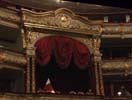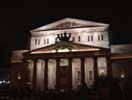|
The Bolshoi - "The Big One" - is back in town with a three-week season that looks set to banish all
memory of its half-cocked London venture in 2001. A decade of political and financial instability
in Russia had left Moscow's premier ballet company fragile to the point of collapse. But with a fresh
stable of performing talent, a zillion-rouble restoration project under way, and an earring-wearing
dynamo newly installed in the driving seat, the company has returned to its feistiest form.
It chose to flag up that form with Don Quixote - a daft 19th-century warhorse that always sorts the men
from the boys. Remember - no, best try to forget - the drear spectacle of the Royal Ballet's Don Q at the start
of Ross Stretton's tenure. This piece requires non-stop brio and the kind of splashy physical heroics that
come naturally to the Russians. Dramatic subtlety? Forget it. Even the music is naff. The whole purpose
of this cod-hispanic romp is bravura, bravura, bravissimo, and the larger-than-life Bolshoi style is just the ticket.
Yet Monday's opening night almost came a cropper when, 10 minutes into the show, all the lights went out.
For a bizarre 30 seconds the corps danced on, jiggling black shapes in the gloom. Did someone forget
to feed the meter? Who can say. This isn't the first time Covent Garden's state-of-the-art stage technology
has gone clunk. After a depressingly long pause, lighting and sanity were restored, and if the glitch
dimmed the dancers' spirits, they were determined not to show it.
A wild succession of chest-slapping townspeople, cape-furling toreadors, guitar-hurling gypsies and steamy
femmes fatales career through Alexei Fadeyechev's traditionally based 1999 staging with a profusion that
tests the dimensions of the Opera House stage. The production's claim to introduce "logical coherence" however,
is a lot of rot. Any story that purports to describe a knight's quest for courtly love but spends two and
a half hours pursuing a flirtation between a Barcelona barmaid and a barber called Basil is beyond the reach
of logic. But do we care? Not a hoot, when there's dancing as brilliant as this.
Only in a Russian production could you find Act II character solos that threaten to steal the principals' thunder.
An unearthly flamenco cameo by the slinky Ilze Liapa - pure hokum, but very sexy - is rendered even sexier
by the desultory purr of castanets. Another Spanish dame with fishnet sleeves and an apparently rubber spine
(Anna Antropova) drew gasps with swooping back bends that flipped her like a fish. I couldn't tell you what
Yulianna Malkhasyants's exotic rant was about (a dead child, a lost lover, excruciating toothache?) but its
sheer passionate conviction drew roars as well as cheers.
But in the end it's the leading couple from which any 19th-century ballet takes its cue, and Maria Alexandrova's
Kitri was as bright, brassy and daring as it's possible to imagine. Her tilted arabesques at the end
of Sergei Filin's one-handed lifts barely registered being seven feet off the ground. And her multiple hops
on point (two dozen? I was too dazzled to count) seemed to grow ever more weightless.
But for my money the more seductive Filin claimed the evening's laurels with his raffish, devil-may-care attack.
No Bolshoi beefcake, Filin's Basil is the boy-next-door who is flash enough to repeatedly lift a ballerina above
his head and let go her waist for a split second each time, waggling his empty hands like a prankster thumbing
his nose. A circus act? Certainly. The Bolshoi season may continue with soberer pleasures, but it started with a corker.
Jenny Gilbert
[home]
[contacts]
| 














